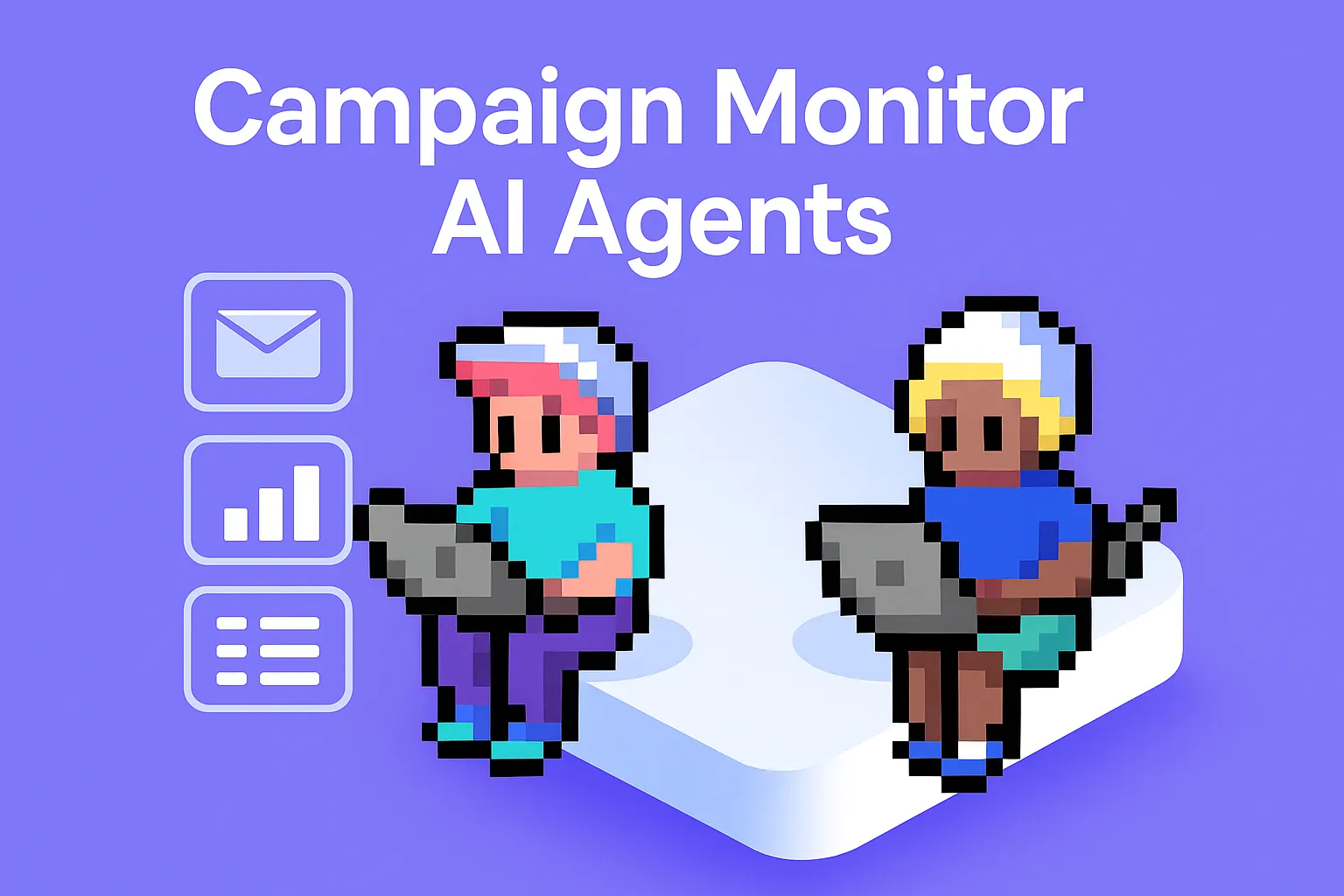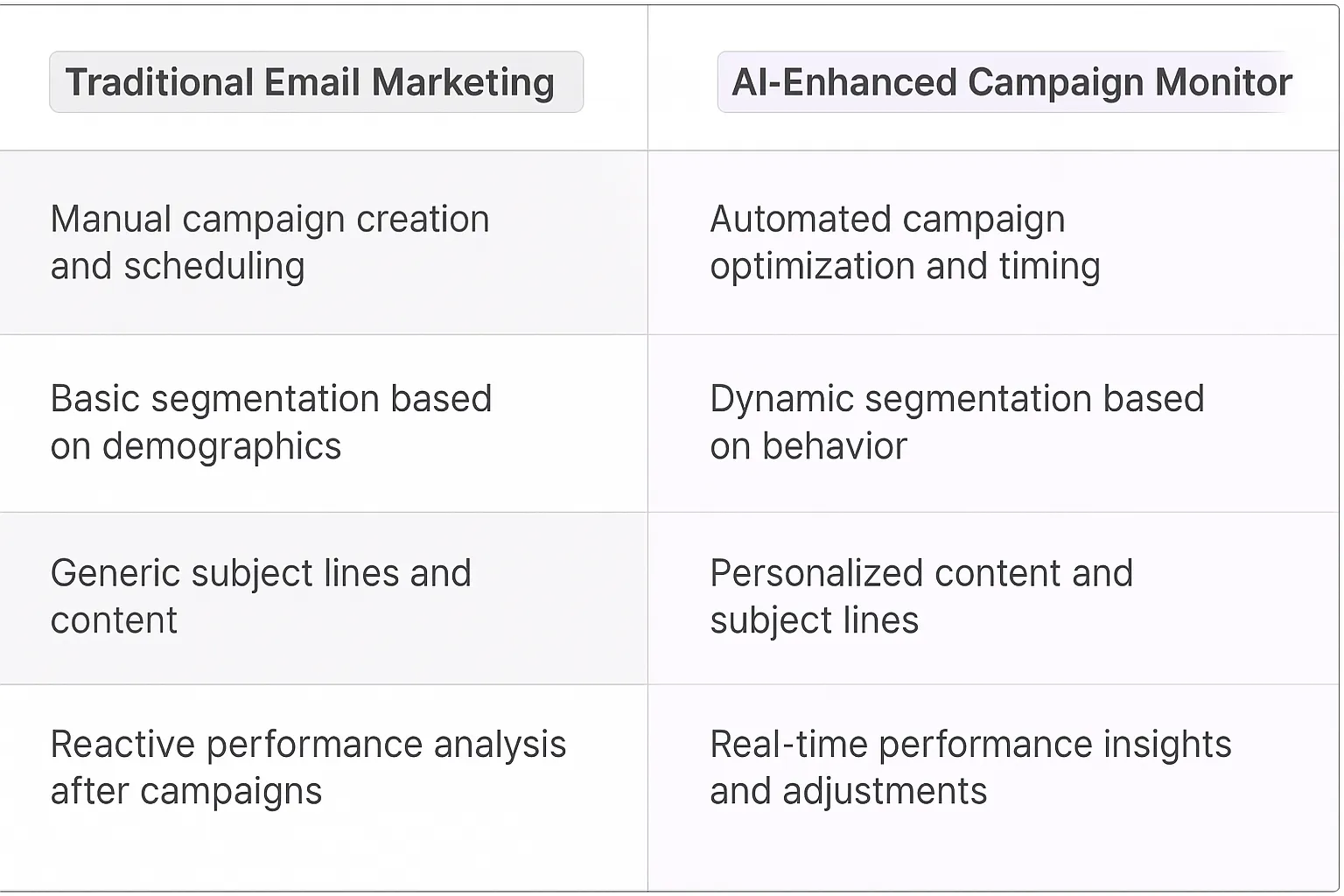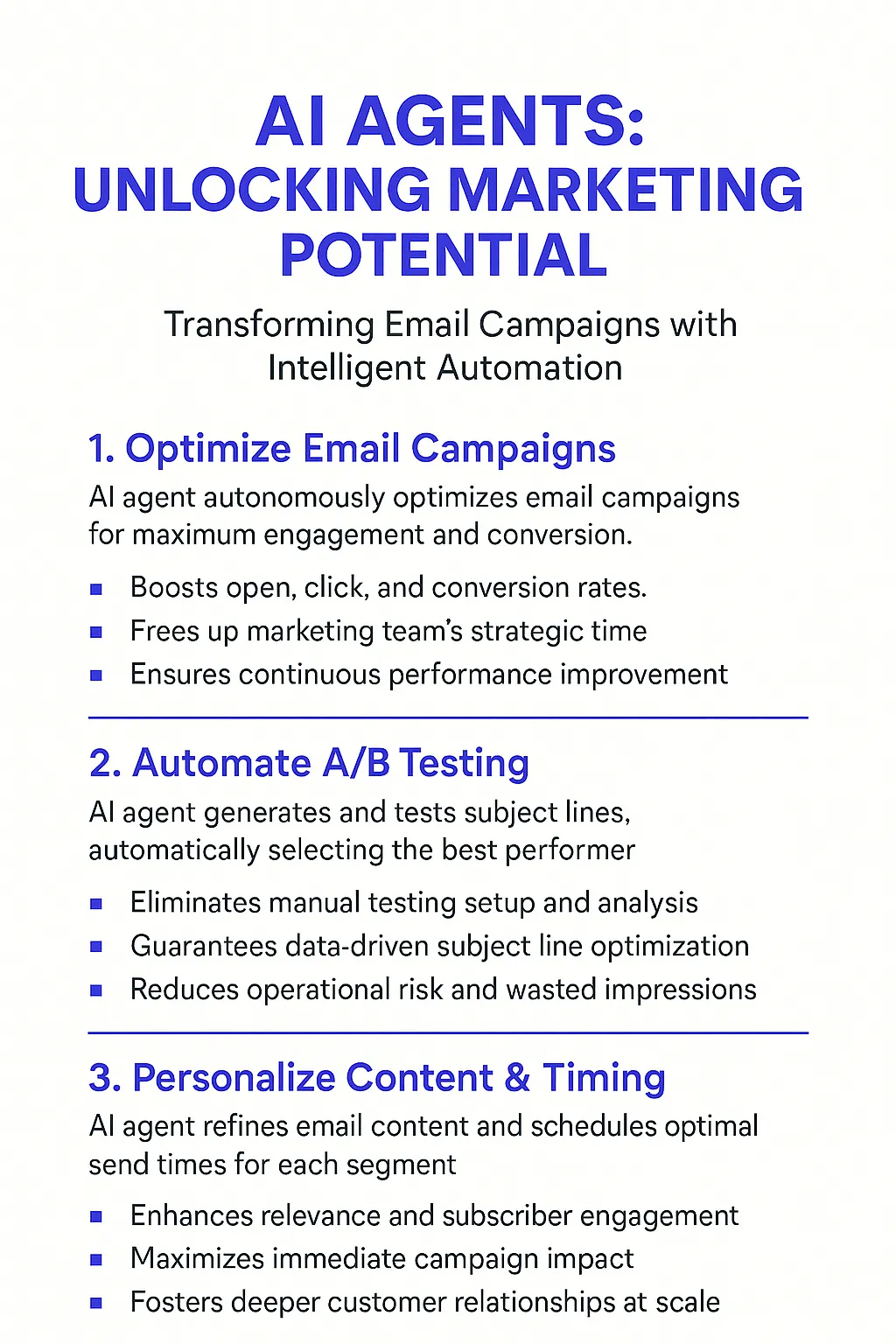Campaign Monitor
Understanding Campaign Monitor's Email Marketing Platform
Campaign Monitor stands as a robust email marketing platform that enables businesses to create, send, and optimize email campaigns at scale. The platform combines sophisticated segmentation capabilities with intuitive design tools, making it a go-to solution for marketing teams across industries. Its core strength lies in delivering personalized email experiences while maintaining simplicity in campaign management.
Key Features of Campaign Monitor
The platform excels in several critical areas:
- Drag-and-drop email builder with responsive templates
- Advanced segmentation and personalization options
- Detailed analytics and reporting capabilities
- A/B testing functionality
- Automated customer journey creation
- Integration capabilities with major CRM systems

Benefits of AI Agents for Campaign Monitor
What would have been used before AI Agents?
Marketing teams traditionally relied on manual processes to manage email campaigns in Campaign Monitor. This meant spending hours writing subject lines, analyzing engagement metrics, and tweaking email copy. They'd often need multiple team members dedicated to A/B testing, scheduling, and optimizing campaigns - taking valuable time away from strategic work.
What are the benefits of AI Agents?
AI Agents transform Campaign Monitor into a significantly more powerful email marketing platform. These digital teammates handle the heavy lifting of email optimization while marketers focus on high-level strategy and creative direction.
The agents excel at:
- Generating multiple variations of subject lines based on historical performance data, increasing open rates by learning what resonates with specific audience segments
- Analyzing engagement patterns across thousands of past campaigns to recommend optimal send times for different subscriber groups
- Automatically personalizing email content for different segments using natural language processing, moving beyond basic merge fields to truly contextual messaging
- Providing real-time campaign performance insights and suggesting specific improvements based on subscriber behavior
- Identifying potential deliverability issues before they impact campaign success by monitoring technical metrics and engagement signals
The most compelling aspect is how AI Agents learn from each campaign's performance, continuously refining their recommendations. This creates a compounding effect where email marketing effectiveness improves over time without requiring additional human effort.
For marketing teams, this means shifting from reactive campaign management to proactive strategy development. Rather than getting bogged down in tactical execution, they can focus on building deeper customer relationships and developing innovative campaign concepts.

Potential Use Cases of AI Agents with Campaign Monitor
Email Marketing Strategy Development
AI agents analyze historical campaign data and subscriber behavior to craft data-driven email marketing strategies. They identify optimal sending times, segment audiences based on engagement patterns, and suggest personalization approaches that resonate with specific subscriber groups.
Content Creation and Optimization
Digital teammates excel at generating compelling email subject lines, preview text, and body content that drives higher open and click-through rates. They can A/B test different content variations and provide recommendations based on performance metrics.
List Management and Segmentation
AI agents continuously monitor subscriber lists, identifying inactive subscribers, cleaning invalid email addresses, and creating dynamic segments based on engagement levels. They spot patterns in subscriber behavior and suggest targeted re-engagement campaigns.
Campaign Performance Analysis
The AI analyzes campaign metrics in real-time, spotting trends and anomalies that human marketers might miss. It generates detailed performance reports and provides actionable insights to improve future campaigns.
Automated Response Management
Digital teammates handle subscriber inquiries, unsubscribe requests, and bounce notifications automatically. They maintain list hygiene and ensure compliance with email marketing best practices.
Customer Segmentation at Scale
AI agents create individualized content recommendations for different subscriber segments, dynamically adjusting email content based on past interactions, purchase history, and behavioral data.
Testing and Optimization
The AI continuously runs multivariate tests across different campaign elements - from send times to content variations - and implements winning combinations automatically. This data-driven approach leads to consistently improving campaign performance.
Integration Management
Digital teammates coordinate data flow between Campaign Monitor and other marketing tools, ensuring consistent customer data across platforms and triggering automated workflows based on specific events or actions.
Compliance Monitoring
AI agents actively monitor campaigns for compliance with email marketing regulations like GDPR and CAN-SPAM, flagging potential issues before they become problems and maintaining proper documentation.
Predictive Analytics
The AI forecasts future campaign performance based on historical data, helping marketing teams allocate resources more effectively and optimize their email marketing strategy for maximum impact.

Industry Use Cases
Campaign Monitor's AI agents are transforming how different industries approach email marketing and customer engagement. The real power lies in how these digital teammates adapt to specific industry needs - from e-commerce businesses scaling their personalized campaigns to media companies crafting compelling newsletters that drive engagement.
Looking at the data from thousands of Campaign Monitor implementations, we're seeing fascinating patterns emerge across sectors. Marketing teams are moving beyond basic automation to create sophisticated, context-aware email programs that respond to customer behaviors in real-time. The AI agents analyze engagement patterns, segment audiences with greater precision, and optimize content timing - all while maintaining the human touch that makes email marketing effective.
What's particularly interesting is how these AI capabilities are breaking down traditional barriers between small businesses and enterprise-level email marketing. A local boutique can now deliver the same caliber of personalized communication as a major retail chain, thanks to AI agents handling the complex data analysis and campaign optimization that previously required entire marketing teams.
E-commerce Email Marketing: Precision-Driven Customer Engagement
E-commerce brands face a critical challenge: maintaining consistent, personalized communication with customers across their entire shopping journey. Campaign Monitor AI Agents transform this challenge into a strategic advantage by analyzing customer behavior patterns and crafting targeted email campaigns that resonate with specific customer segments.
A mid-sized fashion retailer using Campaign Monitor AI Agents can automatically generate sophisticated email sequences based on customer purchase history, browsing patterns, and cart abandonment data. The AI examines product affinity scores and seasonal buying trends to create highly targeted product recommendations that feel personally curated for each recipient.
The real power emerges in the nuanced understanding of customer lifecycle stages. When a customer browses summer dresses but doesn't purchase, the AI Agent crafts follow-up emails highlighting similar styles, complementary accessories, and social proof from other buyers. It adapts the messaging tone and timing based on the customer's previous engagement patterns - whether they're morning browsers or evening shoppers, weekend warriors or workday buyers.
Beyond basic segmentation, the AI Agent continuously optimizes subject lines, email layouts, and call-to-action placement through multivariate testing. It identifies micro-segments of customers who respond better to minimalist designs versus those who engage more with image-heavy layouts. This granular optimization typically drives 30-40% higher engagement rates compared to traditional email marketing approaches.
The system's ability to predict and prevent customer churn adds another layer of sophistication. By analyzing purchase frequency, email engagement rates, and browsing behavior, the AI Agent proactively identifies at-risk customers and triggers re-engagement campaigns before they become inactive. This predictive approach to customer retention often results in a 25% reduction in customer churn rates.
Travel Industry: Data-Driven Email Marketing That Moves People
The travel industry sits on a goldmine of customer data - from booking patterns to destination preferences. Campaign Monitor AI Agents tap into this rich dataset to create email marketing campaigns that capture the nuanced psychology of travel planning and booking behavior.
A boutique travel agency leveraging Campaign Monitor AI Agents can decode complex travel intent signals. The AI analyzes search patterns, previous bookings, and seasonal trends to craft perfectly timed offers. When someone searches for "Mediterranean cruises" but doesn't book, the system automatically triggers a sequence of inspiration-focused emails showcasing relevant itineraries, local experiences, and time-sensitive deals.
The AI's pattern recognition capabilities shine in identifying the optimal booking windows. By analyzing historical booking data across different customer segments, it determines when travelers are most likely to commit. For instance, luxury travelers often book 6-8 months in advance, while adventure seekers tend to make last-minute decisions. The AI adjusts email frequency and content accordingly, delivering cruise deals to early planners and last-minute flight offers to spontaneous bookers.
Email personalization goes beyond basic destination recommendations. The AI Agent considers factors like typical travel party size, preferred trip duration, and price sensitivity to create highly targeted campaigns. A family that previously booked kid-friendly resorts receives emails highlighting similar properties with expanded amenities, while solo travelers get content about boutique hotels and local experiences.
The system's dynamic content optimization has shown remarkable results - travel agencies using these AI-powered email campaigns typically see a 45% increase in booking conversions and a 60% improvement in email engagement rates. The AI continuously refines its approach by analyzing which combinations of visuals, copy, and offers drive the highest booking rates for different customer data segments.
Considerations and Challenges
Implementing AI agents for Campaign Monitor requires careful planning around several key technical and operational factors. The integration complexity varies based on existing email marketing workflows and team structures.
Technical Considerations
API rate limits pose a significant constraint when deploying AI agents with Campaign Monitor. The platform caps API requests at 50,000 calls per day, which can bottleneck high-volume automated campaigns. Teams need to implement smart request batching and queue systems to stay within these boundaries.
Data synchronization between Campaign Monitor and AI agents demands robust error handling. Email campaign data exists across multiple endpoints, requiring careful orchestration to maintain consistency. Failed API calls or timeout issues can lead to fragmented subscriber data and incomplete automation flows.
Operational Considerations
Marketing teams often face a learning curve when transitioning to AI-enhanced workflows. The shift from manual campaign management to automated systems requires new skills and processes. Teams need dedicated training on prompt engineering and understanding AI agent capabilities.
Content governance becomes more complex with AI agents. While they can generate email copy and subject lines at scale, maintaining brand voice consistency requires clear guidelines and oversight. Organizations should establish review workflows to ensure AI-generated content aligns with brand standards.
Integration Challenges
Legacy email templates and custom HTML can conflict with AI agent outputs. Teams must audit existing templates and potentially refactor them to work seamlessly with automated content generation. This often involves standardizing template structures and creating clear content insertion points.
Security protocols around subscriber data require careful configuration. AI agents need appropriate access levels to campaign metrics and subscriber information while maintaining compliance with data protection regulations. Teams should implement role-based access controls and audit logs for AI agent actions.
AI-Powered Future of Email Marketing
The integration of AI Agents with Campaign Monitor marks a significant shift in email marketing capabilities. These digital teammates don't just automate tasks - they create a new paradigm where data-driven decisions happen automatically and marketing teams can focus on strategic initiatives. The combination of human creativity and AI-powered optimization creates a multiplier effect, where each campaign builds upon the insights of previous ones to deliver increasingly better results.
Looking ahead, the role of AI Agents in email marketing will only grow more sophisticated. As these systems continue learning from billions of interactions, they'll unlock new possibilities for personalization and engagement that we're just beginning to understand. Marketing teams that embrace this technology now will build significant advantages in their ability to connect with audiences and drive results.













